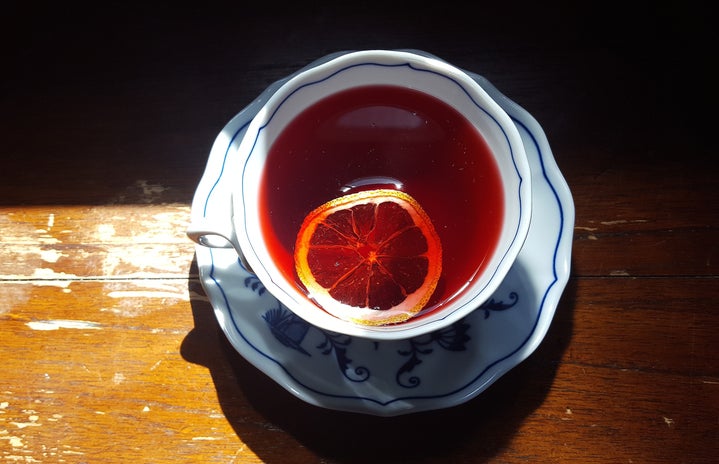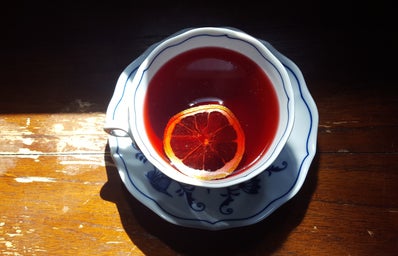Edited by: Kavya Gupta
You’ve been feeling particularly exhausted lately. Your brain feels like cotton has been laced in between synapses and wound around neurones, muffling the firing electrical impulses and signals. And your bones. They seem heavier today, like muscle and fat have ossified and fused together overnight, like you’re being fossilised from the inside out.
Perhaps it’s the weather, or burn-out, or your anaemia is back.
You’ve decided to make a cup of tea. Not because you particularly want a cup of tea, but because you’re desperately looking to dissolve the dread that has stubbornly settled, like a stone, in the pit of your stomach.
You peel yourself off your bed, painfully aware of the mountain of work leering over at you from your desk, assignments and class notes competing for territory on the hardwood surface, and stagger into the shared kitchen on your hostel floor. Someone has left the balcony door open, and the cold seeps into your bones and you feel it chill the air in your lungs.
Step 1
Boil the water.
As you watch the water slowly heat up, you find yourself getting distracted. You think of the air, how much heavier it feels today. If it weren’t for the beige sun and grey sky peeking at you from the ajar balcony door, you’d have sworn the whole world has been drowned, plunged under 10 feet of water, overrun with sea creatures. You entertain yourself with the thought of jellyfish laying siege to the library cafe, eels wrapping themselves around lamp posts, manta rays sprawling across the lawns.
Lately, you’ve been particularly aware of the pointlessness of it all; your little blip of a life, humankind, the universe. And so you’re desperately hunting for meaning in shapes the wisps of steam form before dissipating in the air, forcing tortured metaphors out of the patterns the bubbles make as they break to the surface. The water looks like velvet, ribbed and folding, and you can’t help but think of the sea.
This, of course, reminds you of the everpresent gnawing feeling of apprehension that lurks in the recesses of your mind. You can’t help but feel like a small rowboat, about to push off into a storm, unsure if you are seaworthy.
After exhausting your limited stockpile of trite nautical metaphors, you realise, in your negligence, too much water has been lost and you have to refill the saucepan.
Step 2
Re-boil the water.
Step 3
Add the ginger.
Tea is remarkably accepting, you can put all kinds of spices into it.
One aunt swears by cinnamon sticks, and will painstakingly crush cardamom pods and cloves in her tea. Another wouldn’t hesitate to go to war with you if you omit the freshly picked tulsi leaves and a pinch of black pepper.
This is, of course, fine, but you’re making a cup of tea, not building a spaceship, so instead of fussing with the spice rack, you keep it simple and opt for some grated ginger.
As you grate your ginger directly over the pan of boiling water, you wince slightly as the scalding steam licks at your fingers, and you think of all the times you’ve seen your mother do this, her small, deft hands impervious to the steam.
You wonder if you will ever learn to bear the heat.
You can’t help but think, despite the general unpleasantness of it all, how beautiful the velvet water looks, the ginger shavings dancing in the current. You feel your worry and angst dislodge from the hollows of your bones and seep into the pot. The dread goes next, then the dull ache and hopelessness. They swirl together, their hard, sharp edges dissolve like sugar crystals, melting into the pan.
You really can put anything into tea.
Step 4
Pour water into the cup(s).
I firmly believe everyone is entitled to at least one dubious, strongly held opinion. This is mine, this is the hill I die on.
Experts will tell you to let the tea bag steep for a few minutes before removing it from the cup.
These experts are wrong.
The tea bags are an integral part of the experience and they remain in your cup ‘till the bitter end.
As you’re pouring out the water in your cup, you realise you’ve boiled too much. This is because you’ve learnt how to make tea by mirroring your mothers actions, and you’ve never seen your mother make tea for just one. Rather than let the superfluous tea go to waste…
Step 5
Find a friend.
She tells you she likes the taste of the ginger, and you hope she doesn’t mind the bitter-sweet notes of dread and worry. You tell her that’s an acquired taste, that you eventually grow accustomed to it after a while. She tells you she knows.
You laugh, really laugh, for the first time in what feels like days as she playfully admonishes you for skipping out on the cardamom. You hear the slapping of her slippers against the floor as she races down the hallway to her room to dig out the crushed cardamom she had smuggled onto campus, stolen from the biscuit tin her mother has repurposed as a spice box during her last visit home.
You don’t labour under the delusion that cups of tea are miracle workers. You are suffering from the chronic condition of consciousness, and eventually the world will feel like it’s been plunged underwater again. But, for a moment, you stopped worrying about the mountain of work, and the storm and your seaworthiness. For a moment, you got to share a cup of tea with a friend.


